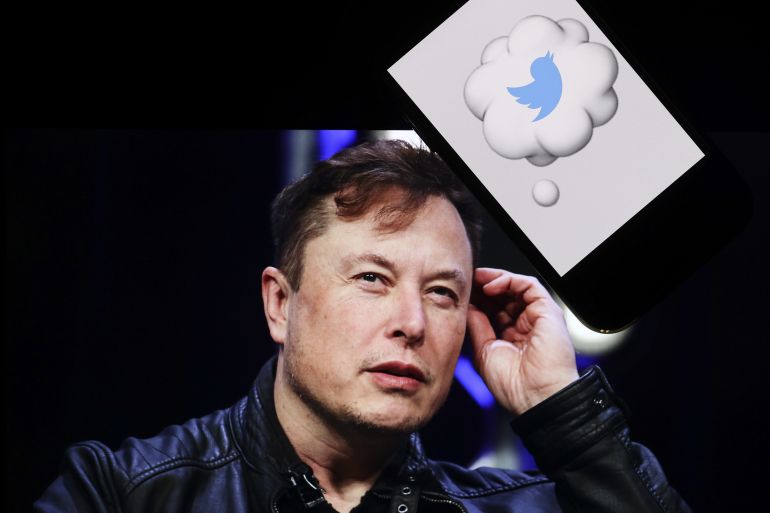Elon Musk’s $44bn Twittocracy
This is my last ever article on Elon Musk.

When I was asked to write about the $44bn purchase of Twitter by Elon Musk – the South Africa-born CEO of Tesla and SpaceX and richest person on the planet – I was torn. I have written about Musk on various occasions in the past, like when Time magazine selected him as its “2021 Person of the Year” even while acknowledging his track record – which comprises numerous allegations of atrociously sexist and racist conditions in his US factories, as well as violations of local pandemic regulations to keep workers working and Twitter threats against employees wishing to unionise.
Time mused that “the vast expanse of human misery can seem an afterthought to a man with his eyes on Mars”, as though apathy for the human condition is somehow a romantic, Person of the Year-type attribute. Earthly misery has meanwhile only been exacerbated by the fact that we now have to hear about Elon Musk day in and day out – which is why I was at first hesitant to contribute to the din.
As Columbia University professor Liza Featherstone remarked on Facebook in the aftermath of the Twitter deal: “People keep nattering on about a certain uninteresting person, who bought an uninteresting social media platform, and all said person wants is this kind of attention.”
She continued: “It’s very enabling, almost as if the world learned nothing from Trump!”
That said, I do have a few more things to say.
Let’s start with the concept of “free speech”, which Musk has relentlessly invoked to justify his latest conquest: “Free speech is the bedrock of a functioning democracy, and Twitter is the digital town square where matters vital to the future of humanity are debated.”
Never mind that live-tweeting one’s bowel movements, one of Musk’s preferred pastimes, would seem to be somewhat less than vital to civilisation – or that anyone who bribes a college kid $5,000 to delete a Twitter account cannot really self-identify as a proponent of free speech. The account in question is @ElonJet, where college freshman Jack Sweeney tracks Musk’s private jet utilising publicly available data; when Sweeney refused the bribe, Musk blocked him – the same mature response that has been applied to countless Twitter users Musk has deemed to be undeserving of the same right to free speech with which the cosmos has endowed Musk.
In addition to blocking, Musk’s Twitter repertoire also includes maniacally lashing out at politicians and others – often in entirely irrelevant and sexually inappropriate ways – for doing things like suggesting that billionaires should pay income taxes. And with Musk now poised to become the god of Twitter, the policy of “free speech for me but not for you” will presumably only soar to new cosmic heights. Already, his lewd tweets are widely alleged to have directly spurred “rampant sexual harassment” at Tesla facilities.
His modus operandi notwithstanding, Musk tweeted on April 25: “I hope that even my worst critics remain on Twitter, because that is what free speech means.” This sent the Musk fan club into a tizzy of adulation, with Florida Republican congressional candidate Lavern Spicer tweeting in response: “An African American owner of the largest social media company on earth. This is historic.” She went even further on Facebook: “Elon Musk buying Twitter is the 21st century version of Lincoln freeing the slaves.”
It is historic, indeed, for a white billionaire from the country that invented apartheid to achieve the label of “African American”. Then again, anything is possible in the so-called “land of the free” – where “democracy” means that a single individual has $44bn to buy a social media platform while a ton of folks have no food or a place to sleep.
The Twitter takeover was also celebrated internationally by the likes of El Salvador’s megalomaniac-in-chief Nayib Bukele, who, like Trump, prefers to govern by social media, and who produced various congratulatory tweets with festive emojis. Bukele went on to tweet a Reuters article about new Twitter “hate speech concerns” raised by human rights groups, and added the following encouraging comment in English: “Hahaha go Elon!”
This is the same Bukele, of course, who is currently presiding over a domestic “state of emergency” that has served as the pretext for the indefinite suspension of human rights, civil liberties, and all that good stuff. An additional law spontaneously enacted in early April threatens “anyone who shares information about gangs with up to 15 years in prison”, as The New York Times notes – a move that effectively criminalises the discussion of Salvadoran reality. So much for free speech.
But back to Musk’s vision of “free speech” that is ultimately not free – and I’m not just talking about the $44bn price tag. He speaks of the ideal “functioning democracy” in which Twitter serves as the “digital town square” – and yet the Muskian view of democracy is one in which he and he alone is in charge of the universe, whether or not the lowly masses realise their great fortune in having acquired such an overlord.
In the end, Musk is hardly an aberration from the grotesque course of capitalism in the US, where the tyranny of the elite and widespread “human misery” – to appropriate the words of Time magazine – is marketed as a functioning democracy. And while Musk has pledged to “make Twitter better than ever by enhancing the product with new features … and authenticating all humans”, none of this is very human at all.
The views expressed in this article are the author’s own and do not necessarily reflect Al Jazeera’s editorial stance.
